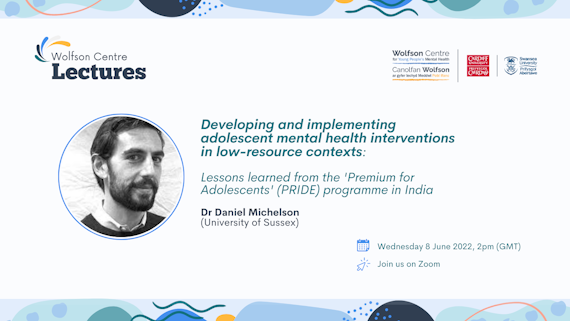Wolfson Centre Lectures - Developing and implementing adolescent mental health interventions in low-resource contexts
This event has ended.
Contact
Add to calendar

'Developing and implementing adolescent mental health interventions in low-resource contexts: Lessons learned from the 'Premium for Adolescents' (PRIDE) programme in India’
Dr Daniel Michelson, Senior Lecturer in Clinical Psychology at the University of Sussex
Lecture focus
PRIDE is a Wellcome Trust-funded programme (2016-22) that aims to develop and test a suite of scalable, evidence-based interventions addressing the major share of the adolescent mental health burden in India.
Designed initially for urban, low-income secondary schools in New Delhi and Goa, the PRIDE intervention model incorporates three design innovations.
First, the content is built around a core set of active ingredients that were systematically identified by matching evidence-based practices to common adolescent problems found in the local context.
Second, PRIDE employs non-specialist (“lay”) counsellors as the primary delivery agents, in line with evidence for the cost-effectiveness of “task-sharing” for mental health care in diverse low-resource settings. Third, a stepped care architecture allows for further resource efficiency.
Dr Michelson has served as Clinical Academic Director for PRIDE since its inception, working alongside the implementation team at Sangath NGO and a group of international investigators led by Prof. Vikram Patel at Harvard Medical School.
The talk will provide an overview of PRIDE activities and outputs during the past six years. Lessons learned will be considered in relation to further implementation of the PRIDE interventions and new directions in India; applications to other low- and middle-income countries; and relevance to underserved populations in high-income countries.
In particular, it will be argued that task-sharing approaches have the potential to play an important role in growing service capacity and re-shaping services to be more responsive to local community needs and assets, including in the UK.